|
 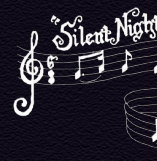 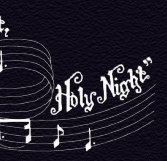 
 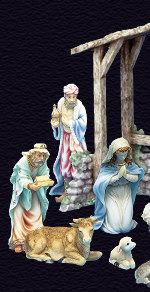 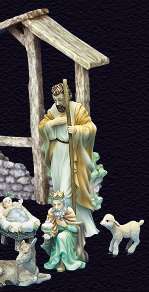 

 Stille
Nacht! Heilige Nacht! Stille
Nacht! Heilige Nacht!
(Silent Night! Holy Night)
Joseph Mohr was born and reared
in extreme poverty in
Salzburg, Austria. His mother,
Anna Schoiber, was a poor
spinster knitter. His father
Franz Joseph Mohr served in the
army as one of the archbishop’s musketeers and left Anna
and Joseph to take care of
themselves while living with
Joseph’s elderly grandmother.

The cathedral choir-master,
Johann Nepomuk Hiernle
became a foster-father to Joseph and took him under his
wings and saw that he got a
proper education. Ordained as
a priest in August, 1815, he was
loved by the people in his
area and never rose above
poverty, because he gave all his
earnings to help educate the
youth in his parish and to
care for the elderly.

Poor health sent him back to
Salzburg from an assignment
at Mariapfarr, and was later
assigned to St Nicholas church
in Oberndorf in 1817. He and his assistant pastor, Franz
Xaver Gruber, an organist, became fast friends; and the rest
is history. On December 24, 1818 Morh’s poem,
“Stille Nacht! Heilige Nacht!”
was sung by Mohr and
Gruber as Gruber played the
organ. What we know as
“Silent Night” is probably one
of the best-loved Christmas
carols in the world. It has been
translated into nearly
300 languages and dialects and
has touched lives ever
since, even soldiers on the
frontlines in more than one war.

“Silent Night” implies that
there is no sound. This was not
the scene of Mohr’s Stille Nacht.
It was what was happening
inside the capsule of this holy
“Silent Night” that attention is
drawn. The event destined to
change all of creation for all
of eternity was the center of
the “stille nacht,” and the
world had nothing to add to the
heavenly sounds. As the world
went about
its usual business unaware,
having no voice or sound to add
to the glorious event, it was silent about the holy
“immaculate” birth that was taking place. The world was
“noisy” as always, oblivious to
what God was doing, while
the heavens were aflame with the eternity-changing scene
being played out in a stable. It was anything but “silent”
in the “capsule.”

An angel, illuminated by the
unearthly glory of God,
visited shepherds on a dark
hillside with an announcement
that would change the world forever--“For there is born to
you this day in the city of
David a Savior, who is Christ
the
Lord.” The herald angel was
joined by a multitude of the
heavenly host “praising God and saying: ‘Glory to God
in the highest, and on earth
peace, good will toward men’ “
(Luke 2). While the Heavenly Hosts sang “Alleluia,” they
pointed the shepherds to “yon
Virgin Mother and Child.”

No, it was not a silent night in
that no sound was heard;
the sound has been heard around
the world as those who
met this Baby born in the stable that night, the Savior,
Messiah, carried the message to others. It was silent in
that no other voice fully understood what was happening;
no other voice had the authority to proclaim that this humble
birth in a stable that “Stille Nacht” would be the means
of bringing salvation to God’s
beloved world. Only this
One whose birth announcement was
heralded to the
lowly shepherds by angels and
has continued to be
echoed through the centuries could fulfill the
prophesies that all of Israel had looked toward.

The “silent night” encompassed
the whole nativity scene from
the time the wise men left their
country following the star
until they arrived about two
years after the birth of the
Christ
child. Attention was being drawn
toward the event, but
acceptance was limited. The
world was silent in
acknowledging the blessed event,
and Satan has tried to
stop every voice that has broken
the silence to herald
the Good News.

The silence of the night was
broken by God’s herald angels.
It was broken when the shepherds came to worship the Child
in the stable. The silence was broken by Herod who performed genocide of
all infants under the age of two
when he learned
of the birth of Jesus. The
silence was broken when the wise
men arrived at the house where Joseph had moved his
family to offer their gifts and worship.

The silence of the night was
broken when the Baby grew
up and God proclaimed Him to be
the Savior who pleased
Him. The Stille Nacht was
utterly shattered when the Man
went to Calvary, died for the sins of the world and rose
from the dead to ascend to the right hand of the Father.
Though it remains a “Heileige
Nacht” (Holy Night),
never again will it be a “Stille
Natcht” (Silent Night).

“But the Lord is in His holy
temple. Let all the earth keep
silence before Him” (Habakkuk
2:20). Every tongue will be
stopped that has spoken against
the Baby born that night.
The world will be speechless as they stand before Him,
the Babe in the manger, the Crucified Man, the Risen Lord.

“…His glory covered the heavens,
and the earth was
full of His praise” (Habakkuk 3:3).

Let us never be silent again
about the coming of the
Savior. Let praises ring and echo through the endless ages
proclaiming Him King of Kings
and Lord of Lords.

Let the herald angels again
proclaim--“That at the name of
Jesus every knee should bow, of
those in heaven, and of
those on earth, and of those
under earth, and that every
tongue should confess that Jesus
Christ is Lord, to the
glory of God the Father”
(Philippians 2:10-11).

“Heilige Nacht!”
(Information on Mohr and Gruber
came from http://www.forthunecity.com)
November 18, 2004
Delores Adams
Copyrighted. All rights
reserved.

Alice's Legacy
Remembering Alice
The
"Handkerchief" has been anointed
and prayed over by
several believers who care about
you and want to help you
realize your full potential in
Christ Jesus Our Lord.
~The
Ten Commandments~
      
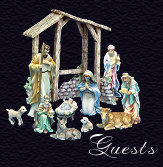







|